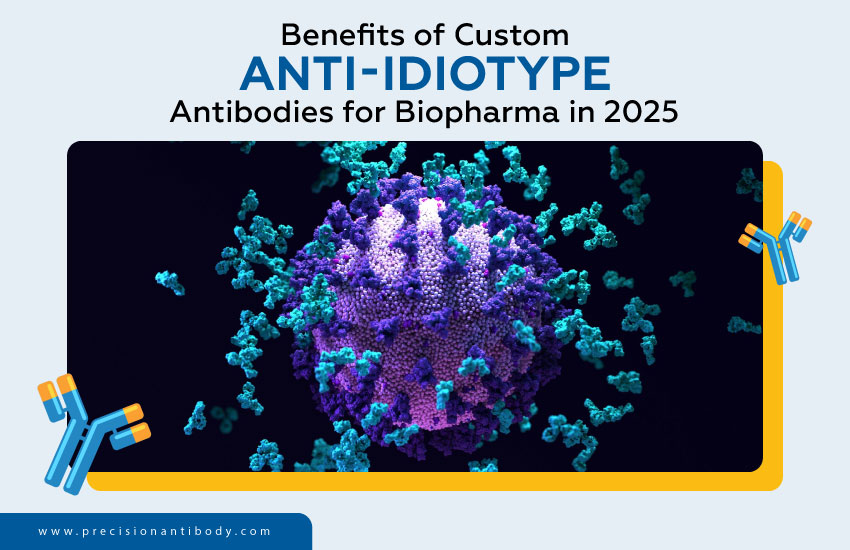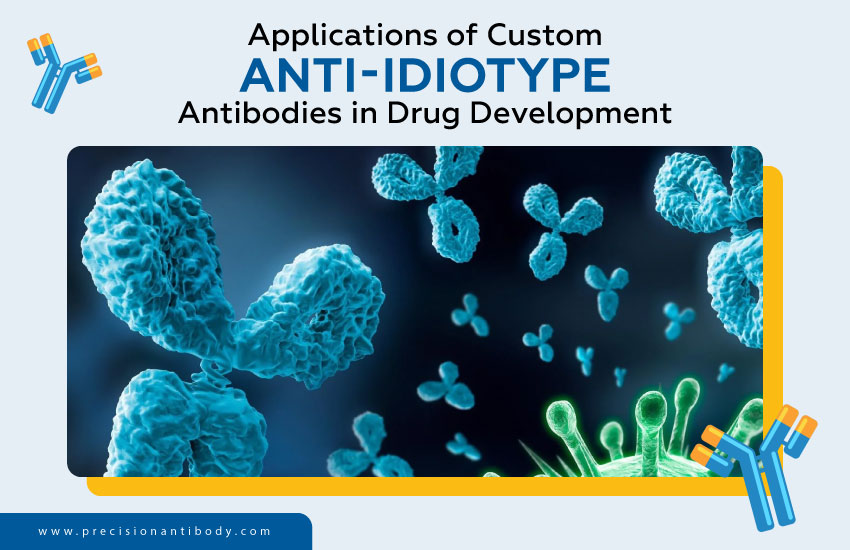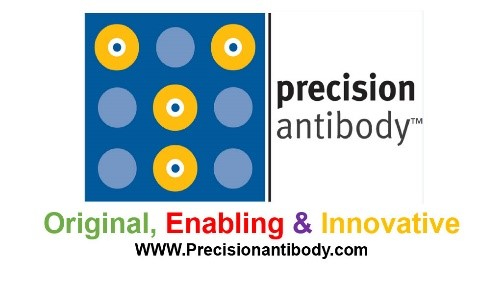
Anti-idiotype antibodies, specialized molecules that bind to target antibodies’ antigen-binding domains (idiotopes), represent a major immunotherapy advance and a revolutionary cancer treatment. These antibodies may enhance patient outcomes by offering tailored therapeutics in personalized medicine as research advances.
As the pharmaceutical business evolves, tailored anti-idiotype antibodies in medication development signal a shift toward more targeted and effective treatments. They revolutionized modern medicine by improving therapeutic specificity and efficiency.
The pharmaceutical environment will change in 2025 due to advances in biologics and monoclonal antibodies. Custom anti-idiotype antibodies are turning the biopharmaceutical business around by improving medication development precision and efficiency. This blog will discuss how unique anti-idiotype antibodies revolutionize drug research, from immunoassay precision to personalized medicine.
Anti-idiotype antibodies are specialized antibodies that target other antibodies’ unique antigen-binding regions (idiotopes). Their great specificity and sensitivity make them necessary instruments in therapeutic and diagnostic applications.
Anti-idiotype antibodies (anti-Ids) regulate immunity. Intelligent humoral immunological homeostasis may be maintained by neutralizing and releasing idiotypic antibodies. Anti-idiotype antibodies stimulate tumor-associated antigen-specific immunity in cancer treatment. They can mimic inadequately immunogenic gangliosides to induce the immune system to attack cancer cells producing them.
Researchers have explored anti-idiotype antibodies as vaccination possibilities. They can imitate illness or tumor antigens to generate an immune response, a new vaccine development strategy. Immune system homeostasis, cancer immunotherapies, and new vaccines require anti-idiotype antibodies. Many immunological and medical uses are being explored.
Key areas of importance:

Modern drug development has greatly benefited from anti-idiotype antibodies, especially in targeted drug delivery, personalized medicine, cancer immunotherapy, and regulatory frameworks.
An outline of their responsibilities in these fields, backed by reliable research sources, is provided below:
Anti-idiotype antibodies aid in the creation of customized therapeutic vaccines in personalized medicine. These vaccines can be customized to each patient’s tumor profile by focusing on particular idiotypes and distinct antigenic determinants of an antibody’s variable region. This improves therapeutic efficacy and specificity. This strategy is a major step forward in developing customized cancer treatments.
In targeted drug delivery systems like antibody-drug conjugates (ADCs), anti-idiotype antibodies are essential. By attaching highly cytotoxic medications to antibodies that selectively bind to tumor antigens, these conjugates enable targeted delivery to cancer cells while reducing harm to healthy tissues. This focused strategy improves the therapeutic index of cancer treatments.
Anti-idiotype antibody use in medication development has important therapeutic and regulatory ramifications. They are crucial references for evaluating possible immune responses against therapeutic antibodies in immunogenicity analysis. This evaluation is essential for novel biological medications to be safe and effective.
Anti-idiotype antibodies play a critical role in developing cancer immunotherapy, personalized medical strategies, targeted drug delivery, and regulatory processes in drug development. They are useful tools in contemporary treatment approaches because of their exceptional capacity to imitate antigens and alter immune responses.

In biopharmaceutical applications, custom anti-idiotype antibodies provide various benefits, especially when it comes to improving therapeutic efficacy, specificity, sensitivity, safety, and precision. An outline of these advantages, backed by reliable research sources, is provided below:
Therapeutic antibodies and their interactions can be accurately detected and quantified due to custom anti-idiotype antibodies‘ high specificity and sensitivity. For instance, because of their high specificity, monoclonal anti-idiotype antibodies are used as test reagents in pharmacokinetic studies to determine the amounts of antibody medicines in human or animal sera.
Custom anti-idiotype antibodies are essential for determining immunogenicity because they make it possible to identify anti-drug antibodies (ADAs) and track medication concentrations. By spotting possible immunological reactions that can have negative consequences, this surveillance guarantees the safety of therapeutic antibodies. For instance, polyclonal anti-idiotype antibodies can help assess immunogenicity by simulating actual conditions in blood samples.
Custom anti-idiotype antibodies offer specialized monitoring and analysis techniques that help expedite the medication development. This effectiveness speeds up the development process and eliminates the need for lengthy testing, which lowers costs. For instance, pharmacokinetic investigations can be made simpler, and research expenses may be decreased by employing anti-idiotype antibodies to identify free antibody medicines.
Therapeutic uses for customized anti-idiotype antibodies include regulating immune responses in cancer and autoimmune disorders. They can increase therapeutic efficacy by suppressing pathogenic immune responses or promoting anti-tumor immunity by targeting autoantibodies or tumor-associated antigens. This focused strategy presents a viable path toward creating novel therapies for these ailments.
Concisely, biopharmaceutical companies can improve the safety and effectiveness of therapeutic interventions by using tailored anti-idiotype antibodies as precise tools for drug discovery, therapeutic monitoring, and developing new medicines.

Specialized antibodies known as custom anti-idiotype antibodies specifically target the distinct antigen-binding regions, or idiotypes, of particular therapeutic antibodies. They have a wide range of uses in drug development and are essential to guaranteeing the effectiveness and security of therapeutic interventions. Key applications backed by quotes from reliable research sources are listed below:
The development of tests to track the pharmacokinetics of therapeutic antibodies relies heavily on anti-idiotype antibodies. They make it possible to assess medication concentrations in biological samples precisely, which makes therapeutic monitoring and dose optimization easier.
Furthermore, these antibodies play a critical role in immunogenicity evaluations, aiding in identifying and measuring anti-drug antibodies (ADAs) that patients may acquire in response to therapeutic antibodies. This monitoring guarantees the therapeutic antibody’s efficacy and safety.
Anti-idiotype antibodies are useful in creating vaccines because they can imitate particular antigens. They can help the immune system identify and fight illnesses by serving as surrogates for antigens. For instance, anti-idiotype antibodies have been investigated as therapeutic vaccines, providing benefits over conventional vaccines, particularly when it is difficult to produce vaccines using non-protein antigens.
The ability of anti-idiotype antibodies to alter immune responses in cancer and autoimmune disorders has been studied. They can promote anti-tumor immunity or inhibit pathogenic immune responses by targeting autoantibodies or tumor-associated antigens. This focused strategy presents a viable path toward creating novel therapies for these ailments.
Custom anti-idiotype antibodies are used to compare the biosimilar candidate to the original therapeutic antibody during the biosimilar development. They aid in guaranteeing that the biosimilar possesses comparable binding properties and effectiveness, which is essential for both clinical success and regulatory licensing.
To put it succinctly, the biopharmaceutical industry benefits from accurate tools for drug research, therapeutic monitoring, and the development of new treatments thanks to tailored anti-idiotype antibodies, which also improve the safety and effectiveness of therapeutic interventions.

Anti-idiotype antibody development presents numerous obstacles, with particular methods to improve efficacy and therapeutic application.
1. Immunogenicity/Cross-Reactivity
Challenge: Patients’ immunological reactions to anti-idiotype antibodies may produce anti-drug antibodies. Therapeutic antibody pharmacokinetics, safety, and efficacy can be affected by ADAs.
Solution: Researchers are producing anti-idiotype antibodies with lower immunogenicity. This involves improving antibody structure to reduce immune system activation. Using humanized or fully human anti-idiotype antibodies can also lessen immunological responses.
2. Specificity/Sensitivity
Challenge: Accurate therapeutic antibody detection and quantification require high anti-idiotype antibody specificity and sensitivity. Low specificity can cause false positives and negatives, affecting treatment monitoring.
Solution: Phage display technology has helped generate anti-idiotype antibodies with improved specificity and sensitivity. Anti-idiotype antibodies with high affinity and specificity for therapeutic antibodies have been generated via phage display, enhancing detection accuracy.
3. Production, Scalability
Challenge: It is challenging to manufacture anti-idiotype antibodies that are therapeutically useful because of the complexity of the systems used to produce antibodies and the requirement for stringent quality control.
Solution: Both the quantity and quality of anti-idiotype antibodies can be improved through advanced expression techniques such as mammalian cell lines. Optimizing the fermentation and purification processes can increase scalability and reduce production costs.
4. Regulatory Approval
Challenge: To obtain regulatory approval, anti-idiotype antibodies must be tested to determine their safety, effectiveness, and consistency.
Solution: To demonstrate the safety and effectiveness of anti-idiotype antibodies, extensive preclinical and clinical trials are required. GMP compliance and production standardization can be beneficial in facilitating regulatory approval.
5. Stability and Storage
Challenge: For anti-idiotype antibodies to continue performing their job, they must be resilient throughout storage and transportation.
Solution: Stabilizing agents and proper storage conditions can achieve a longer shelf life for anti-idiotype antibodies. Lyophilization, often known as freeze-drying, is a technique that is frequently used to improve the storage durability of antibodies.
To successfully create and utilize anti-idiotype antibodies in therapeutic settings, it is required to address these challenges through fresh research and technological advancements. This is needed to achieve the desired results.
Novel complex protein targeting approaches have enhanced drug development by changing “undruggable” targets. A novel method targets protein-protein interactions (PPIs), essential to many biological processes but hard to target due to their large and flat interfaces.
New small compounds and biologics can disrupt PPIs, enabling new treatments. Synthetic α-helix and proteomimetics have shown promise in lowering PPIs linked to various disorders.
Additionally, AI has sped the identification and optimization of molecules targeting complicated proteins in drug discovery. AI-powered platforms can anticipate protein structures and interactions from large databases, helping designers create highly specific and effective compounds.
Using graph-based generative adversarial networks (GANs) to build protein-targeted therapeutic candidates de novo shows AI’s potential in drug discovery.
These novel techniques are changing drug development by targeting complicated proteins that were previously untargetable. Researchers are generating more accurate and effective treatment interventions using sophisticated technologies and integrative approaches.

Targeting specific idiotypes enhances therapeutic accuracy by tailoring antibodies to a patient’s tumor profile. Personalized methods reduce off-target effects and improve treatment. Customized antibodies, such as racotumomab anti-idiotype antibodies, are being studied in the future for cancer immunotherapy to trigger immune responses against tumor cells.
Cancer treatment and custom anti-idiotype antibodies will alter vaccine development. These antibodies can boost immune responses to infections and diseases by resembling disease-specific antigens. Anti-idiotype antibodies mimic antigens without protein-based vaccination issues. This method develops non-protein or difficult-to-synthesize antigen vaccines. Customized anti-idiotype antibodies can treat multiple diseases.
Personal anti-idiotype antibodies may treat autoimmune and immune-modulating diseases. We explore antibodies that reduce autoimmune responses or boost anti-tumor immunity. The regulatory immune response may improve therapeutic efficacy and address illnesses that traditional medications cannot.
Immunogenicity studies with tailored anti-idiotype antibodies measure therapeutic antibody immune responses to assure biological drug safety and efficacy. As technology advances, these antibodies will aid medicine development.
Anti-idiotype antibodies are target antigen surrogates for therapeutic antibody development. Reacting to the initial antigen helps the immune system combat illnesses. The anti-idiotype monoclonal antibody racotumomab is used in cancer vaccinations. Small doses of intradermal racotumomab, an anti-idiotype antibody, can treat particular immunological conditions.
Anti-idiotype antibodies help create PK and TE assays. They measure therapeutic monoclonal antibodies in patient samples to construct complete preclinical and clinical PK and TE tests. Anti-idiotype antibodies have made these assays easier to create, proving their usefulness in drug development.
A significant shift is occurring in the pharmaceutical sector due to the widespread implementation of tailored anti-idiotype antibodies in 2025. These antibodies make specific immunogenicity, pharmacokinetics, and therapeutic monitoring possible, which contribute to improving drug development.
They are an indispensable component in biopharmaceutical innovative development because of their ability to tackle complex difficulties such as cross-reactivity and production scalability. This results in changes being made to the drug development, evaluation, and optimization process.
Anti-idiotype antibodies are tailored to individual research initiatives. This customized method reduces cross-reactivity and improves results. Ready-made anti-biotherapeutic antibodies are out there to enable the construction of strong and reliable bioanalytical assays against marketed biologic medicines, ensuring excellent therapeutic monitoring specificity.
The performance of highly specific anti-idiotype antibodies has increased because of recombinant technology. These innovations have lowered development costs and boosted scalability. There are new developments in anti-idiotypic monoclonal antibodies using an improved hybridoma technique, making serum antibody drug measurement easier.
Therapeutic antibody concentrations are monitored in preclinical and clinical trials using anti-idiotype antibodies. High specificity ensures precise data for dose adjustment and regulatory compliance. Polyclonal anti-idiotype antibodies are employed as positive controls in immunogenicity tests and for detecting, identifying, and analyzing medicinal drugs.
Anti-idiotype antibodies are custom-made to fit drug development methods. Their compatibility with analytical assays, regulatory requirements, and therapeutic goals makes them useful in modern biopharmaceutical research. Customized anti-idiotypic antibodies are produced using a thorough procedure that includes antigen preparation and antibody synthesis to aid in discovering new drugs.
Custom anti-idiotype antibodies are made to reduce cross-reactivity and guarantee accurate and repeatable results in analytical tests. This specificity is crucial for accurate pharmacokinetic and anti-drug antibody assays, as demonstrated by anti-idiotypic antibodies suitable for these uses.
The safety and effectiveness of antibody-based treatments are guaranteed by custom anti-idiotype antibodies, which allow precise evaluation of immune responses to therapeutic antibodies. Anti-ID antibodies with high specificity are created, followed by downstream testing and production services to support research.
AI-driven platforms are changing anti-idiotype antibody design and optimization. Researchers can improve medication development using machine learning algorithms to streamline and lower expenses. Antibody creation companies with years of experience can design anti-idiotype antibody development solutions for clients using modern technology.
Next-generation sequencing, phage display, and AI are revolutionizing tailored anti-idiotype antibody manufacture and use. These techniques improve precision, scalability, and efficiency, changing medication development. High-specificity anti-ID antibodies are created and put through downstream testing and manufacture to aid in research.
Custom anti-idiotype antibodies are revolutionizing drug development and meeting biopharmaceutical innovation expectations with precision, specificity, and adaptability.
These antibodies help solve complex challenges in pharmacokinetics, immunogenicity testing, therapeutic monitoring, tailored medicine, and cancer immunotherapy.
Custom anti-idiotype antibodies meet industrial needs and shape its future as 2025 approaches. Recombinant technologies, AI integration, and creative production processes should improve sensitivity, scalability, and efficiency. Custom anti-idiotype antibodies lead scientific progress in precision medicine, drug delivery, and therapeutic antibody safety.
They are the next generation of tools to advance medicine delivery, research, and discovery, improving patient outcomes and transforming healthcare worldwide. In the comments below, we’d love to hear your opinions on how bespoke anti-idiotype antibodies are changing medicine development.

Led by innovative minds in immunology and the antibody development field, Precision Antibody has been an industry leader for over 20 years. We not only implement a cutting-edge technique in antigen design, antibody development, production, and other analyses, but we are also constantly working on ways to improve and advance technology to match the ever-changing world of science. If you are interested in learning more about Precision Antibody’s Custom Antibody development.
Precision Antibody™ is the forefront of the global Custom Antibody industry & it is led by the innovative minds in immunology and antibody development field.